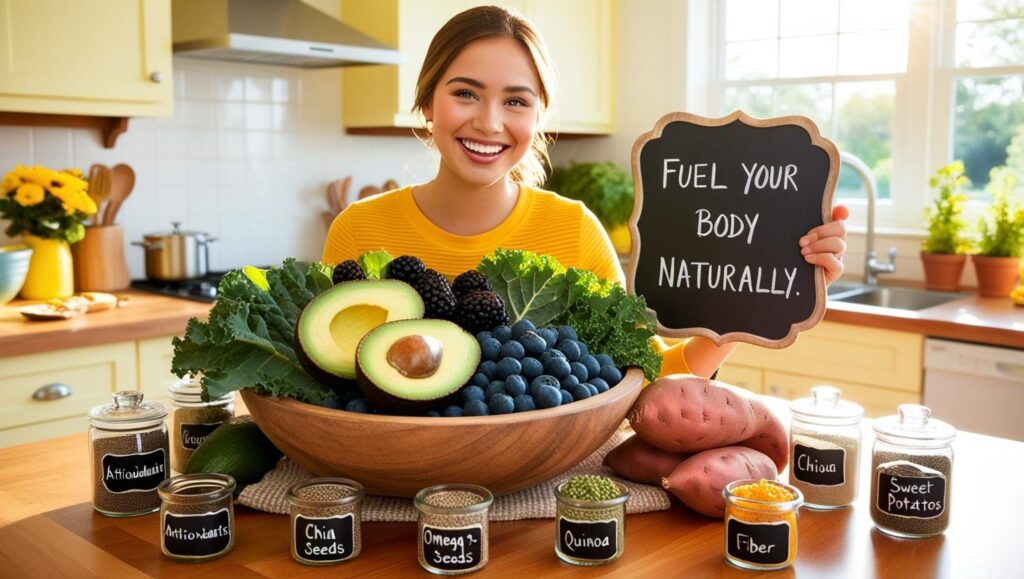A Complete Guide to Foods Powered by Nutrients
The phrase “superfoods” became very popular in the health and wellness sector in recent times. Social media influencers as well as nutritionists all seem to be discussing the nutrient-dense foods which are said to possess outstanding health benefits. But what are superfoods, and do they live up to their hype?
In this step-by-step manual, we will examine:
- ✔ What is a superfood?
- The most popular superfoods and their benefits
- Scientific evidence supporting their health statements
- ✔ How to include superfoods in your nutrition
- ✔ Popular myths and misconceptions
After this, you will have a definite answer about whether the so-called superfoods are something you should include in your regular meals.
What are Superfoods?

Superfoods are foods rich in nutrients which are especially healthful and beneficial because of the extremely high concentrations of:
- Vitamins (A, C, E, K)
- Minerals (iron, calcium, magnesium, zinc)
- Antioxidants (flavonoids, polyphenols, carotenoids)
- Healthy fats (omega-3 fatty acids)
- Fiber (digestive health and gut health)
In contrast to processed foods, superfoods are whole, natural, and barely refined, providing the highest amount of nutrition per calorie.
Why are Superfoods so popular?
- Prevention of disease: Several superfoods are associated with lower risks of chronic conditions such as heart disease, diabetes, and cancer.
- Increased mental clarity & energy: Brain functions are enhanced by nutrient-rich foods that decrease fatigue.
- Weight control: The protein and fiber content helps control hunger.
- Anti-wrinkle action: Antioxidants help to reduce the oxidation of skin proteins.
But keep in mind that no single item can offer all nutrients—variety and balance are invaluable!
Top 10 Superfoods and Their Proven Benefits
Below are a few of the most researched and well-known superfoods:
1. Blueberries
Why? Loaded with anthocyanins, effective antioxidants that are anti-inflammatory.
- Promotes cognitive health (could slow down mental decline)
- Decreases blood pressure
- Improves heart health
2. Kale
Why? One of the most nutritionally rich leafy greens with vitamins A, C, K as well as calcium.
- Strengthens the immune system
- Supports detoxification
- Encourages healthy skin
3. Salmon
Why? A rich source of omega-3 fatty acids (EPA & DHA).
- No.
- Reduces inflammation
- Promotes heart and brain health
- May reduce depression risk
4. Chia Seeds

Why? Rich in fiber, protein, and omega-3’s.
- Boosts energy
- Aids digestion
- Helps stabilize blood sugar
- Stays with you longer
5. Turmeric
Why? Has curcumin, a powerful anti-inflammatory agent.
- Decreases joint pain (useful for arthritis)
- May reduce cancer risks
- Supports the liver
6. Quinoa
Why? It’s a complete protein (has all 9 essential amino acids).
- However,
- Beneficial for muscle healing
- Gluten-free alternative to grains
- Rich in iron and magnesium
7. Avocado
Why? Rich in healthy monounsaturated fat and potassium.
- However,
- Promotes heart health
- Helps lower bad cholesterol (LDL)
- Encourages radiant skin
8. Almonds
Why? Rich in vitamin E, magnesium, and essential fatty acids.
- Supports
- Increases cognitive abilities
- Strengthens the immune system
- Assists with weight management
9. Green Tea
Why? With catechins, which are antioxidants that combat free radicals.
- Boosts metabolism
- May lower cancer risk
- Enhances mental alertness
10. Dark chocolate (70%+ cocoa)
Why? With flavonoids which enhance blood flow.
- Generally,
- Reduces blood pressure
- Improves mood
- Shields against heart disease
Do Superfoods Actually Work? The Science of the Claims

Though most so-called superfoods have scientifically valid advantages, a few are overstated. Here’s what the research suggests:
✅ Demonstrated Advantages
- The health benefits of berries: Research finds blueberries and strawberries to enhance heart health.
- Omega-3s & brain health: Fatty fish like salmon reduce cognitive decline risk.
- Fiber & digestion: Chia seeds and oats support gut health.
❌ Overhyped Claims
- Foods called “miracles” (no one food, however, melts fat like magic).
- “Cure-all” pitches (superfoods are beneficial but not medical treatments).
Takeaway: Superfoods are a component of a well-balanced nutrition, not a magic bullet.
How to Add Superfoods to Your Diet
You do not have to use fussy ingredients—superfoods are easily incorporated into meals:
Breakfast Ideas
- Smoothie bowl (spinach, berries, chia seeds, almond butter)
- Oatmeal with walnuts and flaxseeds
Lunch and Dinner
- Salmon salad with avocado
- Turmeric-spiced vegetables with quinoa stir-fry
Snacks
- Dark chocolate almonds
- Green tea with a handful of blueberries.
Pro Tip:
- Purchase frozen superfoods (berries, spinach) for their affordability.
- Alternate varieties to access a diverse nutrient spectrum.
Common Myths About Superfoods
Myth 1: “Superfoods are pricey and not easily accessible.” Reality: Most (such as beans, oats, and eggs) are an affordable option.
Myth 2: “You must consume superfoods every day to be healthy.” Reality: A well-balanced diet is more important than stressing about a couple of foods.
Myth 3: All superfoods are exotic (e.g., goji berries or acai). Reality: Even ordinary foods (such as lentils and sweet potatoes) are superfoods!
Final Judgment: Should We Call Them Super?
Indeed! Superfoods provide outstanding nutritional qualities and are beneficial for health. But…
But they need to complement—not supplant—a mixed, whole-food diet.
Key Points
- ✔ Focus on whole, minimally processed foods.
- Mix superfoods with proteins, good fats, and carbohydrates.
- ✔ No single food guarantees health—variety is essential.
Ready to Improve Your Diet?
Begin by introducing one or two superfoods to your diet during the week. Little changes will compound over the long term. What is your favorite superfood? Share with us in the comments! Sources
Generate Audio Overview
![]()






